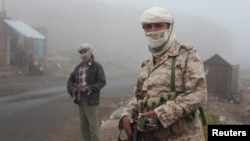In the first few weeks of the Saudi offensive, Ghaida’a Motahar, a wife and the mother of a 4-month-old son, tried to get used to the bombings in the Yemeni capital, Sana’a. But it late April, a Houthi military base was bombed near her house.
“It was unbelievable,” she said in her Sana’a home. “I felt at that moment that there is a rocket hitting my house.”
She grabbed her son and hid in the stairwells as debris and dust rained down inside her home. Now she lives in constant fear, and the bombings in Yemen continue.
Yemen is expected to be high on the agenda in Riyadh this week, as U.S. Secretary of State John Kerry heads to Saudi Arabia for talks Wednesday and Thursday.
Peace talks, relief efforts
Some Yemenis hope the meetings will jump-start peace talks and relief efforts, but analysts warn the Saudi-led coalition is determined to win a military victory in Yemen despite U.S. fears that a dragged-out war will destabilize the region.
Humanitarian aid has grown increasingly scarce in Yemen since the coalition began airstrikes in March, according to the International Committee of the Red Cross. Some of the food aid on the ground isn’t reaching the people because there is no fuel to transport it, the organization said.
“The harsh restrictions on importations imposed by the coalition for the past six weeks, added to the extreme fuel shortages, have made the daily lives of Yemenis unbearable, and their suffering immense,” Cedric Schweizer, who heads the ICRC in Yemen, said in a statement Monday.
In the coming days, Kerry is expected to try to convince Saudi officials to focus less on a military victory in Yemen and more on slowing the humanitarian crisis, said Giorgio Cafiero, co-founder of Washington, D.C.-based Gulf State Analytics.
“Washington would like there to be a cease-fire and greater humanitarian assistance from the international community,” Cafiero said, adding U.S. officials would also like to “start to see the various parties in Yemen meet at a round table to hold talks aimed at resolving the conflict."
On Tuesday, Saudi King Salman announced plans to open a humanitarian aid coordination center in Riyadh, adding that the offensive in Yemen had “achieved its goals,” without providing details.
Saudi Arabia and its allies are determined to continue fighting until the Houthis are beaten, said Cafiero. The Sunni kingdom views the Shi'ite Houthi militants that control much of Yemen as a hostile proxy-army for its rival, Shi'ite-led Iran, on the Saudi southern border.
Iran relationship
As Iran’s relationship with the West thaws with a possible nuclear deal on the horizon, Cafiero added, Saudi Arabia is getting nervous – an issue U.S. diplomats are expected to also address this week.
“Right now Washington is trying to achieve an improved relationship to Iran while also not having its alliance with Saudi Arabia deteriorate as a consequence,” he said.
The U.S. State Department has expressed its support for peace talks, but has not overtly condemned the strikes, which it once openly supported. The administration has previously expressed concerns about civilians killed in airstrikes, and the growth of extremist groups in Yemen.
“We still believe that ultimately political negotiations remain the only long-term path to stability and prosperity for the people of Yemen,” said Jeff Rathke, a U.S. State Department spokesman at a briefing Monday.
Ending the airstrikes, however, will not necessarily end the fighting. In Yemen it’s not just the Houthis against the Saudi-coalition-backed government. A complex web of alliances are battling in Yemen and it may be a war Saudi Arabia simply cannot win, Cafiero said.
“There is a bigger risk that Saudi Arabia will find itself in a quagmire in Yemen,” he added. “Many people have compared the risks in Yemen to a Vietnam-like situation that the U.S. faced back in the 1960s and '70s. It is unlikely that Saudi Arabia will achieve a decisive victory in Yemen.”
Airstrikes
But the Saudi-led airstrikes are stripping the Houthis of their heavy artillery and they eventually will be forced to stop fighting, making way for peace talks, said Saudi-based Abdulaziz Sager, who chairs the Gulf Research Center in Riyadh.
“As far as the military achievements – it has been achieved,” he said. “So now it’s left in the hands of the Houthis.”
After the meetings this week in Saudi Arabia, leaders from the Gulf countries plan to travel to the U.S. to meet with President Barack Obama ahead of expected Yemen peace talks later in the month in Riyadh.
Some Yemenis have high hopes talks will slow the carnage.
"I want this war to stop,” said Motahar, of Sana'a. “I want them to start their political consultation. No one will win this war. Everyone will lose. Especially the Yemeni people. They are the biggest losers in this war.”





